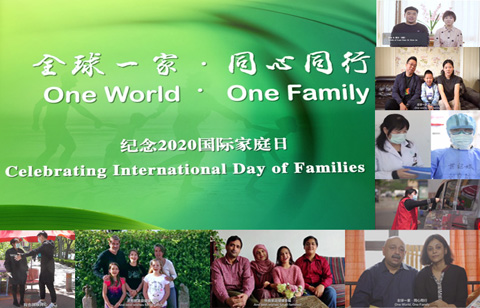Nursery Care System Construction from Perspective of Women and Family Development — A Dialogue with Professor Ren Yuan of Fudan University
Date:2021-9-9 9:17:15 Views:The Standing Committee of National People's Congress adopted a decision on the amendment of the Population and Family Planning Law on August 20, 2021, which includes the third-child policy. The revised law clarifies that the country will roll out more supportive measures for births and stipulates a push for establishing affordable, government-subsidized nursery-care service systems. In fact, some plans about establishing such systems have been carried out. The discussion on the relationship between child care and women's development has become a focus of academic concerns. How does nursery-care service affect women's employment? What social and cultural realities are behind these factors? How should the establishment of nursery-care service systems better meet women's demands and promote the development of family?
Ren Yuan, a professor at the Institute of Population Research at Fudan University, was interviewed by China Women's News on these topics.
Impact Assessment: Nursery Care Is Conducive to Women's Labor Participation and Long-Term Development
Journalist:
In May 2019, the General Office of the State Council issued guidelines on promoting the development of child-care services. In 2021, as the country continued to relax its family-planning policy, many targeted measures to facilitate nursery services have been enhanced.
China has amended the Population and Family Planning Law which stipulates a push for establishing affordable, government-subsidized nursery-care service systems. How do you think this reflects the country's macro policy directions?
Ren Yuan:
The healthcare and education of children before they are three years old play an important role in their self-development, and investment in children's care and development is also of great importance to the family welfare system, as it is closely linked to women's development and the overall well-being of the family. Inadequate welfare systems for child care will increase the burden on families, weaken their desire to have children, and widen the imbalance between family and work, especially for women. Therefore, from the perspective of national and family development, child care should be of great concern to the current national development system and welfare system.
With progress of marketization, changing demographics and an increasingly weakening family function, the dilemma of child care is increasingly prominent, and so are conflicts between child care and women's development. The demand for child care in social development is increasing, but related public services are inadequate.
Since 2019, the country has paid more attention to the establishment of a social service system for child care. The government has introduced many supportive policies and brought measures to support births into the rule of law. The social service system for child care is expected to be further developed in the next five to ten years.
Journalist:
The development of the nursery-care service system has many positive social benefits, among which the effect on women's employment is particularly obvious. Based on your recent research, could you explain the influence of nursery-care services on women's labor participation in China? In our previous interviews, we found that apart from the explicit impact, there are some factors that are difficult to quantify in terms of the "motherhood penalty." Does this mean that the positive benefits of nursery-care services for women's development are long-term?
Ren Yuan:
The "motherhood penalty" is a phenomenon by which women's pay decreases once they become mothers. Recently, our research team carried out a nationwide survey on the construction of a childbearing-friendly society. The data showed that nursery-care for children under the age of 3 can significantly improve women's labor participation, and the benefits to women's working hours have been a result of women's increased labor participation.
At present, child care in China depends largely on grandparents' care. In our research, we also found that nursery-care had a significant effect on women's labor participation, regardless of whether there was parental help.
The "motherhood penalty" has some comprehensive, long-term effects on women's development, and the "motherhood penalty" caused by child care brings about long-term effects. The reduction of labor participation and the interruption of careers will have a negative effect on women's long-term wage levels, job promotion and development. As a result, nursery-care services provided by social institutions are not only beneficial to women's current occupations, but also produce cumulative benefits for their entire life cycle. Birth makes a difference in family development, and nursery-care can help women and families respond to the changes and achieve a balanced life and better development.
Problem Analysis: Nursery Care in Traditional Gender Cognition and Involved Rural-Urban Differences
Journalist:
We have learned that nursery-care services have positive effects on women's employment, but do they have an impact on men's employment? Many studies show that it is still common for women to bear the primary responsibility for child care. Do you think the establishment of an affordable nursery-care system will help to reverse the traditional thought that "it's mother's duty to raise child?"
Ren Yuan:
Our studies show that nursery-care services have positive effects on women's employment, but has no significant impact on men's employment, which reflects that in the current gender-based division of labor, women shoulder most of the responsibility of child care.
I don't think the establishment of nursery-care systems will directly reverse the gender norm that "it's mother's duty to raise child," but under the current pattern of gender division of labor, nursery-care services will be especially beneficial to the development of women. It is absolutely necessary to change the traditional thought and promote men's family participation. Men's involvement in child care also benefit the alleviation of family-work conflicts and the development of women, which is itself an important measurement index of gender equality. Research also shows that men's involvement in housework has a positive impact on families' willingness to have children.
Journalist:
China is a society with an urban-rural dual structure. Is there any difference in the influence of nursery-care services on women between urban and rural areas? How do you think nursery-care services in urban and rural areas should meet the needs of women working in various fields?
Ren Yuan:
Different production and lifestyles in urban and rural areas bring different demands for social child-care services. Compared with the more flexible production and lifestyle in rural areas, modern production in cities makes family care for children more difficult. The nursery-care service itself is the result of urbanization. With the penetration of urbanization, rural areas need to develop nursery-care services.
In fact, there are urban-rural differences in the cities as well. For example, nursery-care services are more important for migrant women with rural household-registration in urban areas. Migrant children can attend public schools in the compulsory education stage, while infants and preschoolers are not included in compulsory education. Many migrant women and children have to be apart from their families, in which grandparents take care of children in the countryside, or migrant women have to return to the countryside to take care of their children. This exacerbates the constraints on the development of children and women. Given that the families of migrants also have an urgent need for nursery-care services, the establishment of nursery-care service systems should provide residence-based services to all.
Seeking Path: Building Child-Care System Should Balance Family Development and Fertility Services
Journalist:
According to your article published last year, nursery-care services should not be simply regarded as part of social policies to stimulate births, but should be explored in the context of family policy. In your opinion, what kind of nursery-care services will better promote the overall development of families under the third-child policy?
Ren Yuan:
The development of nursery-care service policies will help increase the birth rate, but I don't think that is the only goal of developing nursery care services. In the context of the third-child policy, nursery-care service is an important supportive policy, which requires establishment of relevant systems.
The importance of nursery-care services for family development should be emphasized. Family planning should aim at providing services and support for childbearing, and nursery-care is an integral part of family policies. A good family policy should take into account services and support for childbirth, women's employment and development, the balance between family and work, the improvement of family welfare and gender equality.
Encouraging births should not bring pressure to women's development, nor should increase of births compromise women's development and family welfare. Family planning needs to shift from a narrow perspective of mere consideration of fertility to a holistic perspective of family development and childbearing services so as to support the needs of family development and birth and achieve the comprehensive goals of children and women's development.
Journalist:
On August 7, a professional board for child-care services was formally established in Beijing. In view of this new initiative and other local policies, what are your suggestions for the current exploration of child-care institutions?
Ren Yuan:
Professional associations are conducive to pooling the strength of all sectors of society and promoting the development of high-quality child-care services.
In recent years, remarkable progress has been made in the establishment of nursery-care service systems, such as the establishment of service standards and social associations. More enterprises are actively promoting the development of the child-care market.
There is still a long way to go in terms of the optimization of child-care services. It is necessary to summarize the experience of local practices and learn from the development of nursery-care services in other countries and regions. In Nordic countries, for example, there are small class- and home-based child-care services in addition to nurseries. For the development of child-care services, the joint efforts of the government and social forces should be called for. Financial input is needed and social input is encouraged to expand.



